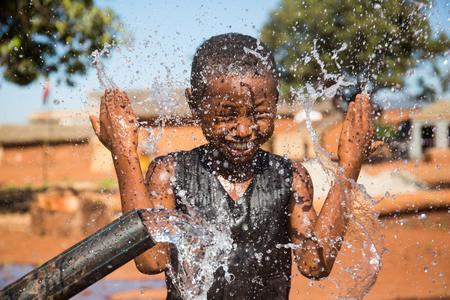What has climate change got to do with water?
Our climate is changing at an alarming rate and it’s making it even harder for the world’s poorest people to get clean water. More frequent and extreme flooding is polluting fragile water sources; longer droughts are drying up springs. People need a reliable supply of water that keeps pumping through flood, drought and natural disaster. Because with clean water, they can stay disease free, go to school, earn a living and be better prepared for whatever the future brings.
Did you know that 2020 was the joint hottest year on record? Only 2016 matched last year's heat. Globally, temperatures are rising, which means the weather is becoming more extreme, resulting in either too much or too little water. In fact, a staggering 90% of all natural disasters are water-related, and they're massively impacting people's lives.
Before the spread of COVID-19, millions of people in Nigeria were already struggling with a public health catastrophe. A shocking 3 in 10 people in Nigeria don't have clean water close to home, putting them under constant threat from waterborne diseases like cholera. The more our climate changes, the more challenging this becomes.
Every day, already fragile water supplies are at even greater risk of disappearing completely.
The world has made huge progress in giving everyone, everywhere the clean water that is their right. Yet climate change threatens to set us back decades and push more people into extreme poverty.
How is climate change affecting people?
What does WaterAid do to help the people worst affected by climate change?
We provide water services communities can rely on.
We arre working with partners and side-by-side with the poorest and most marginalised communities in Nigeria to help them get a steady supply of clean water, come rain or shine. We have been doing this for 20 years, so we know exactly what it takes.
We provide waterpoints and pipe networks that can withstand floods, so people continue to have clean and safe drinking water. And we help people monitor and manage their water supplies properly to meet their basic needs in times of drought.
There is a lot more to do. Our planned work includes raising waterpoints and toilets, so they withstand floods and don’t contaminate water; storing rainwater in rooftop tanks or ponds for times of drought; or helping communities monitor water levels so they can prepare for shortages.
Find out how we’re using technology to provide reliable sources of water
We work with governments and businesses for bigger change
We share our knowledge with governments and the private sector to change even more lives. We work with governments to make sure access to clean water is at the heart of their climate adaptation and development plans.
But nowhere near enough government money is invested in helping people most vulnerable to climate change. Our research shows that in some of the poorest countries in the world, as little as $0.20 per person is spent each year on making water services climate resilient.
We're calling for an urgent tenfold increase in climate finance spent on getting sustainable, clean water to the people currently forced to live without, so they can cope with the effects of climate change.
A sustainable future, resilient to climate change
Clean water can create a ripple effect that will be felt for generations. By ensuring people have clean water close to their homes, they will be better able to stay free of disease. When they are healthy and well, they are better able to go to school or to grow food they can eat or sell. And they will be better able to earn a living, and put money aside for the future. In short, communities will be stronger, so they can plan and prepare for whatever tomorrow brings.




